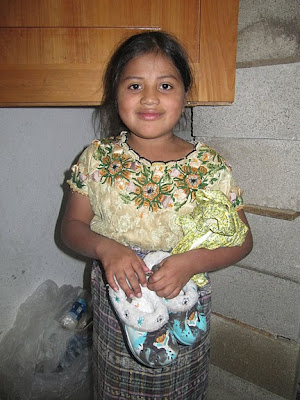The Children of Guatemala are Starving
The Children of Guatemala are Starving - From the Tico-Times.net
 Paulina Noj sits with three of her eight children.
Paulina Noj sits with three of her eight children..CUYUTA, GUATEMALA – Children in Guatemala are starving. But like their parents, one might not notice.
There are few bones jutting out, few oversize heads and bellies. But a slow, deep hunger has been building in Guatemala for decades. And now it’s destroying a generation.
In the drab-sounding hamlet of Lote 14 (Lot 14), 100 kilometers south of the capital in the department of Escuintla, 2-year-old María sits still on her mother’s lap, her twig-like arms dangling limply. Weighing a third less than she should, María looks frighteningly small. Staring at the mud floor of their empty kitchen, her mother, Paulina Noj, explains the daily struggle to feed María and her other seven children.
Her husband is lucky – despite rampant unemployment, he has a job, but he only earns $40 a week. Before, that was just enough for them to buy the basics – corn and beans. But rising food prices have doubled the cost of corn over the past year and they can no longer get enough to feed all 10 in the family.
“Everything is so expensive now that sometimes we just can’t buy corn,” Noj said. “There isn’t always enough to feed the kids.”
Clearly hungry herself, Noj can’t produce breast milk to feed her little girl, and has helplessly watched her get “very skinny.”
But skinny, small children are so normal here that it took Noj months to understand there was a serious problem. In fact, few Guatemalans find it odd that 4- and 7-year-olds will often look the same age.
Almost half of Guatemalan children suffer from chronic malnutrition; in rural Mayan areas it’s worse. And this slow hunger means that physical growth is being stunted as bodies are deprived of vital proteins. Malnutrition also has an invisible effect on the mind in the form of diminished brain development.
Malnourished children like María, who suffer physical and cerebral starvation in their early years, will never recover. Willem van Milink Paz, a representative for the World Food Program in Guatemala, calls chronic malnutrition a “life sentence” that condemns generation after generation.
The dimensions of the problem are already immense, and they continue to grow. According to UNICEF, Guatemala has the fourth-highest rate of chronic malnutrition in the world, lagging behind just a few arid countries, including Afghanistan.
Looking around Guatemala’s lush landscape – dominated by plantations of bananas, sugar cane, coffee, and corn – this seems impossible. But historic inequality means that half this land is owned by only 2 percent of Guatemala’s 14 million people. Wealth is similarly concentrated, making Guatemala one of the least-equal societies in the world. And with the region’s lowest tax rate of 11 percent, change is unlikely soon. The result is that the majority of Guatemalans live in miserable poverty, struggling to access land, jobs, education, health care, and now food.
In the last few years, climate change has brought a series of natural disasters and erratic rainfalls that destroyed small plots of land many subsistence farmers depend on to feed their families. No longer able to grow crops, more Guatemalans have to buy food.
Religious and cultural beliefs have made family planning unpopular, so rural couples often try to feed six or seven children on incomes that can barely feed two.
 Aid workers weigh Arazeli, a dangerously malnourished 2-year-old Guatemalan girl.
Aid workers weigh Arazeli, a dangerously malnourished 2-year-old Guatemalan girl.Natasha Pizzey-Siegert Rising food prices globally and locally have made life even harder for many Guatemalans. “We are talking about a 60 or 70 percent rise in food prices since January last year. That’s basic food. … Corn is at the highest [price] in history right now”, said Van Milink Paz.
“Last year we could buy six corn tortillas for 12 cents; now we get three or four,” said Noj. Even beans are out of her reach now, and luxuries like eggs and meat are unthinkable.
It’s hard to imagine her daughter María making it to school. But if she does, she will likely find that up to eight in 10 of her classmates will be malnourished too. Their stunted brains will struggle to keep up in class, and many will fall years behind in school.
They will be sick often with diarrhea and respiratory disorders that will make them lose even more weight. Some may die.
Those who live will grow up to be weak adults with a reduced physical and mental capacity. Ultimately, they will start the cycle again: malnourished parents producing malnourished babies.
Inevitably, this cycle is stunting Guatemala’s development. Billy Estrada, undersecretary of food security for the Guatemalan government, admits, “We can’t even guess how much this is costing [the state] because it’s just so big.”
The costs of repeated school years, emergency health care and food handouts can be estimated, but the earnings lost because Guatemalans have been malnourished en masse are immeasurable.
“When these malnourished children are men, … maybe they will work the land, but they won’t be able to fully develop. … It will be hard for them to come up with ideas to start their own business and so on,” Estrada said.
Despite the obvious and urgent need for the government to tackle this problem, lack of political will and fiscal constraints have held back progress. The latest aid programs run by outgoing President Álvaro Colom were widely accused of being vote-buying schemes for their lack of transparency.
Estrada insists that the real problem has been a lack of consistency in programs. Turning them into a long-term strategy protected from politics is essential. But with a new government coming in January likely to overhaul all existing programs, underdeveloped children with underdeveloped brains look set to be Guatemala’s destiny.
Labels: Guatemala, Mayan families







































